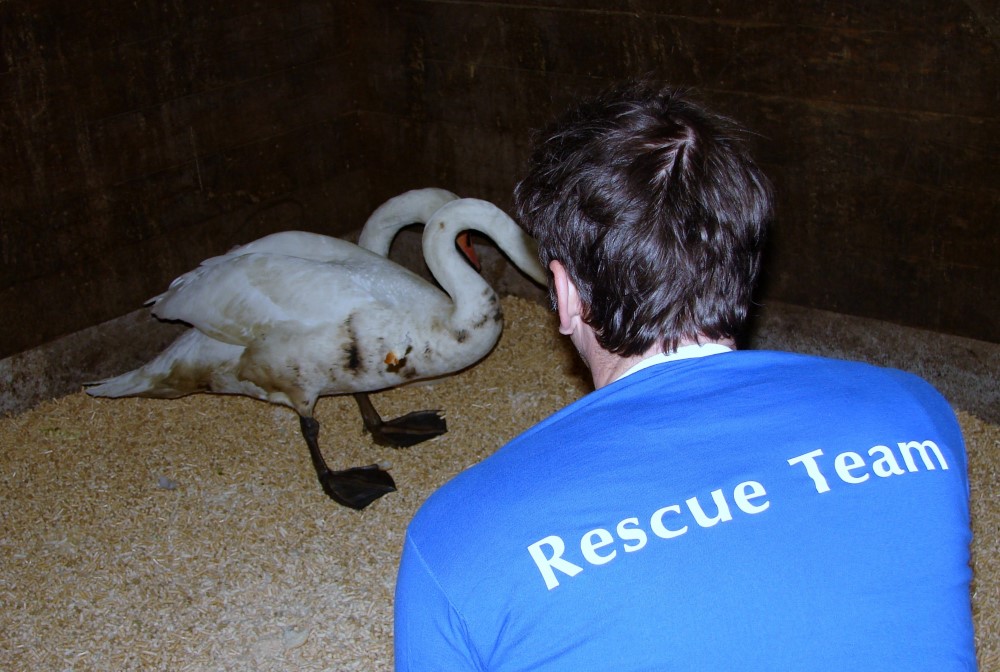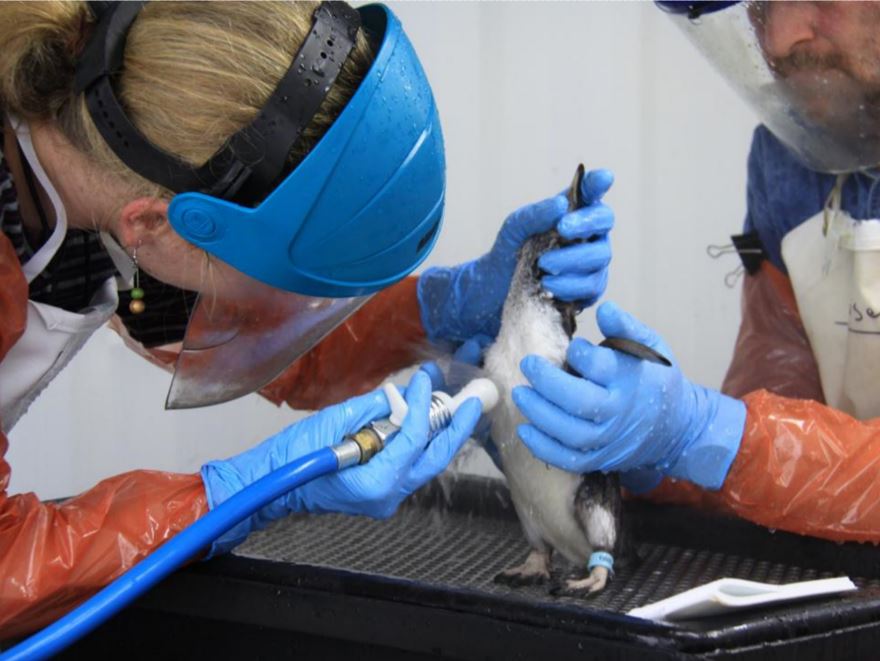GOWRS Partner Interview - Episode 5: PRO Bird
In this fifth episode in the GOWRS Partner Interview series, Paul Kelway, Wildlife Preparedness and Response Manager, interviews Sascha Regmann from PRO Bird in Germany.
The intention is to transition the project to a global oiled wildlife response service, with a guaranteed four-person wildlife assessment team available as a supplementary service through OSRL. We are posting monthly conversations with each network partner to raise awareness of the amazing organisations that have been collaborating on this.
If you wish to watch the video of this interview, you can view it here.
Interview with PRO Bird
Transcript
Paul: So Sascha, thank you so much for joining me today.
Sascha: Hi Paul, thank you for inviting me to this interview.
Paul: Great, well PRO Bird are the fifth interviewee in our series of interviews with the GOWRS Partners. So just to begin with, I wanted to ask you if you could briefly introduce PRO Bird. What is your mission and where and how do you carry out your work?
Sascha: The PRO Bird network started in 2004. Different German animal welfare organisations have worked before separately on several oiled wildlife response campaigns European wide, like the Erica, Prestige, Tricolor oil spills and then in 2004 we had a mystery spill here at the German coast and we found out that it makes more sense to focus our work under one umbrella, especially dealing with authorities, clients, and the media. Of course, that is much easier that way, and speaking with one voice mixing up the teams, gaining experience means having more manpower and equipment. Then finally, PRO Bird was registered in 2014 and accepted as a not-for-profit organisation.
Paul: That's great, so you are a network, but you have this longstanding history of working together. Is there one example of a story that perhaps illustrates the work that you do and speaks to that?
Sascha: Yes, so there are several stories, after all those campaigns. Working with animals in need is always a very emotional issue and people don't like to see pictures of oiled wildlife and dirty beaches and things like that on television or in the newspapers. But it's a good sign to show responsibility by trying to rescue affected wildlife, and after all those years and campaigns, every time you release a clean bird, this is a highlight for every responder, and therefore we always invite new volunteers or local people when we are releasing animals. The moment a former patient is released back to the wild makes people happy, and it shows that the measures that you have done were 100% right. But now coming back to your direct question. I remember that at one oil spill we had a bird, a cormorant, that was already ringed (banded). By checking the ring number, we found out that this animal was oiled and rehabilitated and released six years in England. So, we were saving that life for a second time. That was really a great feeling and maybe this is the one story that I can mention.
Paul: It's a fantastic story and it speaks to, as you say, the importance of applying the right technical standards as well so that we can have those success rates and hopefully see long term survivability of animals as well, and great to have people involved in the release of those animals and see the outcome of all that work.
Sascha: Yes, absolutely.
Paul: Great. Well as well as all the work that you do in Germany and in Europe, PRO Bird have also been a partner in the global oiled wildlife response system (GOWRS) project. What do you see is one of the most significant achievements of that project, of that collaboration?
Sascha: Yes, so working with such a pool of specialised people and organisations provides a unique opportunity of exchanging experiences. Within the past few years, we have had the chance to visit a lot of GOWRS partners in their comfort zones, that means at their rehabilitation centres. Just by visiting their facilities and their equipment and all the long conversations in the evenings and all the discussions, we have learned a lot from each other. Every time, when I am back home and I reflect on the visit, I think - what have I seen? What have I learned? How can we implement parts of that into our system? But it's not just visiting our partners and learning from their experiences. It's also the permanent exchange also within our fantastic GOWRS working groups that raises the quality and brings us international specialists closer together.
Paul: That’s great. It's been a long journey to develop this level of collaboration and now to be ready to transition this project into a live service. What do you see, as some of the most important benefits for wildlife response preparedness of having it now transition into a service?
Sascha: So for us as an organization that's easy to answer. A funded service will give us the opportunity to grow. We can have regular trainings and exercises and that will also raise the quality of courses and we will have to opportunity to bring new people in and maybe to hand over one day our experiences to the next generation of oiled wildlife responders. We are not that young anymore and therefore a funded service will enable us to expand our equipment as well and bring more people into the game. One additional barrier for us as a non-native English speaker is that we have to translate all the materials that we are developing within GOWRS and also within our European network including the technical vocabulary used in trainings and exercises. It's really hard to understand for German staff and volunteers. Therefore it's a little bit of double work for us, but it's worth it.
Paul: So clearly some real benefits as far as really shoring up the expertise that exists today, and hopefully making sure that it remains available in the future. I suppose the second part of that question is what do you see as some of the benefits of the service when we think about an oiled wildlife incident, when we think about what happens when you have a situation involving wildlife?
Sascha: Yes, so I'm working in the exercise working group and we have seen the benefit in some of our exercise scenarios. There are GOWRS Partners in America and South Africa, South America and in New Zealand for example. So in most parts of the world, I think we will be able to respond rapidly and provide recommendations. We have found that it's easy to mix the different groups. If we for example, will have wildlife response somewhere in the Americas, we can mix up the team to best support that specific incident. I think this is a very interesting for the industry.
Paul: Yes, as you say, it's that ability to draw on a pool of experts and essentially create the right team for the right situation. And I know there's been many examples that you've been involved in in Europe where international experts have really been able to add value to those in-country responders and really make sure that they feel supported and that they have the benefit of that experience.
Sascha: So during our discussions found out that we have experts for this, and for that animal species which makes it also very interesting, as you cannot know all the species on Earth as a responder if you are working in Europe, for example. But we have those partners in South Africa or South America dealing with penguins, for example, so therefore we can act very quickly and we can act on different animal species.
Paul: Finally our next featured GOWRS partner will be the RSPCA. In our last discussion we had the Oiled Wildlife Care Network provide a bit of an introduction to PRO Bird. So I was going to ask you if you would be willing to do the same and just say something that you particularly admire about the RSPCA who will be our next guest?
Sascha: Yes, so the RSPCA is one of the oldest and biggest animal welfare organizations here in Europe. They have a lot of experienced staff and inspectors, dedicated animal rescue vehicles and they run several wildlife rehabilitation centres, as well as animal shelters. And in all those years the RSPCA have saved countless numbers of pets, farm animals and wildlife. I very much appreciate that engagement. It's simply incredible.
I think what I also can say about RSPCA is that we met some people from the RSPCA first I think it was om 2003 during the Tricolor oil spill in Belgium and since then our ways have crossed often. We met them again in 2006 during a mystery oil spill in Estonia and then three years later in Norway during the Full City Oil Spill oiled wildlife response. In the aftermath of the response to the Full City spill in Norway, we decided to build up a kind of a European wildlife responders’ cooperation. This was really the starting point here in Europe and the Sea Alarm Foundation that is based in Brussels brought us to a table together and so they asked RSPCA, The Wildlife Rescue Center in Ostend, PRO Bird and some other stakeholders to share protocols, experiences and visions for the future. So we started developing common guidelines, for example, and that led to the EUROWA Project that was co-financed by the European Union in 2014-15. It was the same time that the GOWRS Project got started so very busy days as you can imagine.
The two people that have represented the RSPCA within our group are Adam Grogan and Richard Thompson. I know both since long years and I can say they mean much more to me than simple working colleagues. Adam has a huge knowledge in organising and steering a group and making big step progress with that group. I also very much appreciate his background in mammal species. If you have a question about otters, for example, we will ask Adam. Richard Thompson has decades of background in the care of oiled wildlife and hi knowledge is tremendous. In fact Richard is part of PRO Bird’s Board of Advisors.
Paul: That's right, so there is a formal link between your organisations?
Sascha: Yes, so I'm really looking forward seeing both of them again very soon.
Paul: That's great Sascha. And again, it really reinforces the great relationships that exist and the respect that's there between the different wildlife partners that work together. That's a really great introduction, and I'll look forward to talking with them [the RSPCA] next time. But just before we wrap up is there anything else that you'd like to share before we close?
Sascha: Yes, so I would like to meet all my colleagues again very soon, but coronavirus is a big issue. We had these problems within our European network recently where we had to cancel plans for trainings. We normally would like to have a manager training course in Ostend, Belgium, this month but it's still not clear if it's ok to go there so it’s still up in the air. The pandemic situation is a hard task I think for all of us - all those telephone conferences and this is now almost two years ago that Covid started. So it’s a hard task and I'm really looking forward to seeing everybody again soon.
Paul: Yes, let's hope that we can do that soon. In the meantime, it's great that we can connect virtually, but it's not as good as doing it in person as you say. But Sascha, for now, thank you so much for speaking with me today, and I wish you and PRO Bird all the best for the future.
Sascha: Thank you very much, Paul.
Paul: Bye for now








